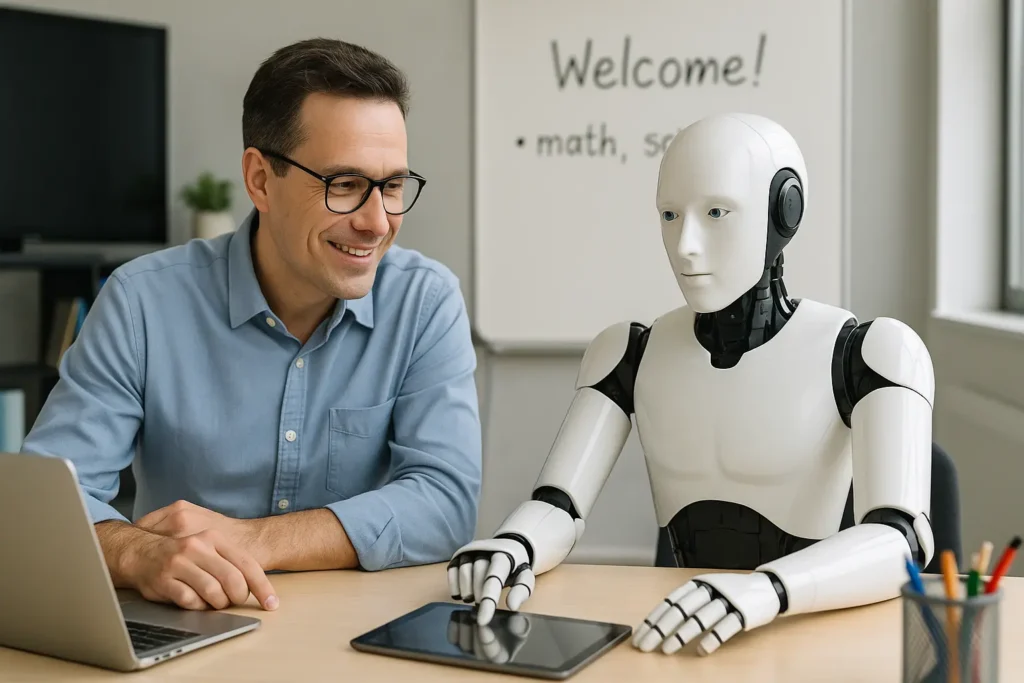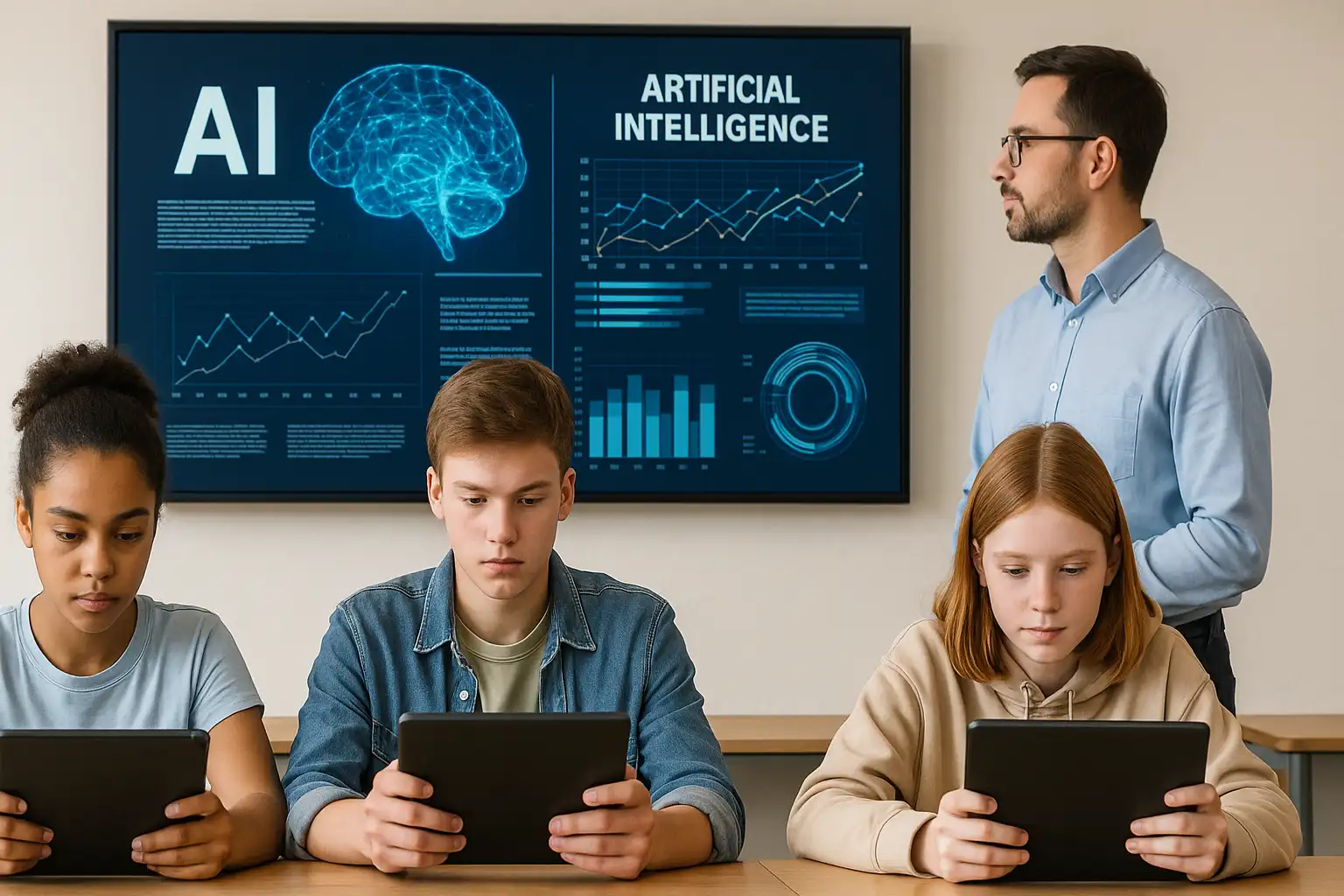Artificial Intelligence (AI) has arrived in schools, and it’s changing how we teach and learn. But with so much innovation, it’s normal for teachers and schools to ask: Should schools be concerned about AI in education?
Let’s talk honestly and simply about this. Imagine you’re chatting with a fellow teacher during a coffee break. That’s the tone we’ll use here—friendly, clear, and real. By the end of this post, you’ll feel more confident about how AI is affecting education and what steps schools can take.
Should Schools Be Concerned About AI in Education?
Yes, this is a question we must ask. At the beginning of the conversation about AI in classrooms, many people feel excited. It sounds futuristic, smart, and powerful. But when we take a closer look, it’s also natural to feel a bit worried.
AI can do things like correct assignments, create lesson plans, or even answer student questions. Cool, right? But… does this mean teachers are being replaced? Are students learning less because AI is doing the thinking for them?
Let’s break it down and understand what’s really going on.
What AI Can (and Can’t) Do in Schools
AI is a tool. And like any tool, it can be helpful or harmful—depending on how we use it.
Here’s what AI can do in education:
- Personalize learning: AI can adjust lessons to each student’s level.
- Save teachers time: Automates tasks like grading or planning.
- Provide instant help: Students can ask AI for explanations anytime.
But AI also has limits:
- It doesn’t understand emotions like a human.
- It can give wrong answers or biased results.
- It can’t replace the teacher’s connection with students.
So yes, schools should be careful, but not scared. AI is not a villain—it’s a helper that needs guidance.

Why Are Some Teachers Worried About AI?
It’s completely normal to feel uneasy about something new. Teachers have shared several common concerns about AI:
- Fear of job loss: “If AI can do everything, will they still need me?”
- Too much screen time: Kids already spend hours in front of screens.
- Loss of student thinking: If AI writes essays, are students still learning?
These are real worries—and they matter. But most of them can be handled with the right balance. AI doesn’t replace teachers; it supports them.
Imagine AI as your teaching assistant. It helps, but you’re still the one leading the class.
👉 Learn all about the ethics of AI in education with practical tips, real examples, and clear guidance for responsible classroom use.
How AI Can Be a Powerful Ally in the Classroom
Used the right way, AI can actually make teaching better, not worse.
Let’s look at some practical examples:
- A teacher uses AI to prepare quizzes adapted to each student’s level.
- A student with learning difficulties uses an AI app that explains things in simpler language.
- Teachers use AI to translate materials for students who speak other languages.
In all these cases, AI is not taking over. It’s helping make learning more equal and effective.
What Schools Should Do to Use AI Wisely
So, should schools be concerned about AI in education? Yes—but they should also be informed and prepared.
Here’s what schools can do:
- Train teachers: Offer simple courses on how to use AI tools in class.
- Create rules: Set clear guidelines about where and when AI can be used.
- Talk with parents: Keep families informed about how AI supports learning.
- Focus on ethics: Teach students how to use AI responsibly.
When schools lead the way, AI becomes a partner—not a problem.
The Ethical Side of AI in Education
Let’s not forget: AI also brings some ethical questions.
- Where does student data go?
- Who decides what AI is allowed to say or do?
- How do we avoid unfair treatment caused by biased algorithms?
These are big questions, and schools can’t ignore them. It’s important to choose safe and transparent tools, and always put students’ well-being first.
For a deeper look at these ethical dilemmas, the UNESCO guidelines on AI in education offer valuable recommendations to help schools make responsible and student-centered choices.
Key Points About Should Schools Be Concerned About AI in Education?
- AI can help with personalized learning and save teachers time.
- Teachers worry about job loss, screen time, and student thinking.
- AI is not a replacement—it’s a support tool.
- Schools need to train staff, create rules, and focus on ethics.
- Ethical use of AI requires attention to data, fairness, and safety.
Conclusion
So, should schools be concerned about AI in education? The answer is yes—but not out of fear. Concern helps us be cautious, ask questions, and build something better.
AI is here, and it’s not going away. But when schools lead with heart and knowledge, AI becomes a powerful ally. Let’s embrace it with responsibility, kindness, and care for our students’ future.
Now it’s your turn: What do you think about AI in schools? Share your opinion in the comments—we’d love to hear from you!

